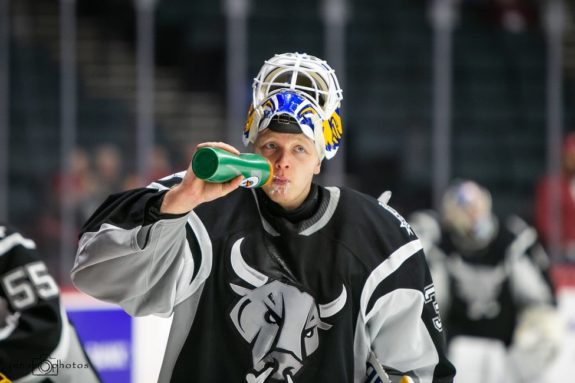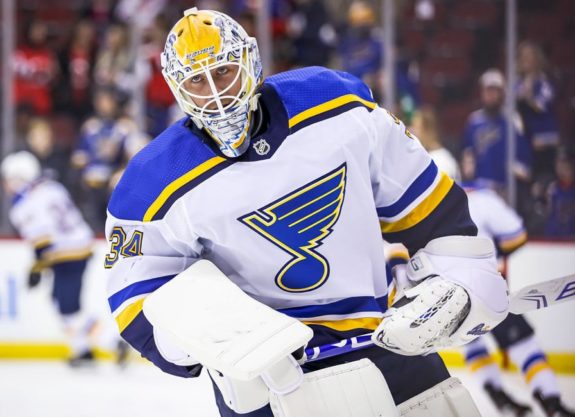The St. Louis Blues had their apparent goalie of the future emerge out of nowhere during the 2018-19 season when Jordan Binnington evolved from backup American Hockey League (AHL) goalie to Stanley Cup Champion netminder over the course of six months. But before Binnington’s sudden progression, the apparent goalie of the future was Ville Husso, the 2014 fourth-round selection from Finland.
Since the team drafted him, Husso has had an interesting developmental path through Finland’s Liiga, to the AHL, with stints in the ECHL and at the international level. At times he’s looked like a future star, at other times a potential bust. Now, at 25, he likely needs to make the next step in his career. So there’s one simple question: does Husso have a future with the Blues? To answer that, let’s take a look at the goaltender he’s been so far.
Husso’s Progression
The Blues drafted Husso off the back of a season in which he posted a 1.99 goals-against average (GAA) and a .923 save percentage in 41 Liiga games with HIFK. Moreover, he helped his nation win gold at the U20 World Junior Championships (WJC). The following season, he earned the honor of being named a Top 3 player on Team Finland, and in the season after that, he dominated. He played 39 games with a 1.91 GAA and a .927 SV%, leading the league in both categories. He was a league All-Star and won the Urpo Ylönen Award for the Liiga’s best goaltender.

Armed with the confidence of winning an award that successful Finnish imports like Antti Raanta, Niklas Bäckström, Kari Lehtonen, and Miikka Kiprusoff had all won before him, Husso traveled to America, splitting time between the AHL’s Chicago Wolves and the ECHL’s Missouri Mavericks. Thanks to playing just 22 AHL games that season, he was eligible to and did join the AHL All-Rookie team the following season, posting a 2.42 GAA and .922 SV% in 38 games. He also helped represent Finland once again internationally.
Husso’s seemingly meteoric rise hit its first serious snag during the 2018-19 season when the Blues’ AHL affiliate moved fully over to the San Antonio Rampage. He played just 27 games, struggling with injury and some backup duties, and had abysmal stats with a 3.67 GAA and .871 SV%. he also watched his former backup Binnington climb to hockey’s highest prize. It seemed like his certain place in the Blues’ future plans was shaken.
But on a paltry Rampage roster that was seventh-worst in the AHL by points in 2019-20, Husso seemed to rebound considerably. He played 42 games, a career-high in any league, and had respectable numbers at a 2.56 GAA and .909 SV%. His performance was enough to convince the Blues to sign Husso to a two-year, one-way contract in January, which begs the question: if Husso’s contract is one-way, does the team expect him to play in the NHL in the 2020-21 season?
Husso Replacing Allen?
When general manager Doug Armstrong signed Husso, he could not have known about the coming COVID-19 pandemic; however, the decision may have worked out in his favor in light of those developments. The Blues, like many NHL teams, will be facing a severe salary cap crunch in the coming seasons. They likely cannot afford a luxury like Jake Allen’s $4.35 million salary as a backup. But there will be teams who will be interested in trading for Allen after a strong rebound season, especially to see if he is a good fit there for the long term, as he’ll be an unrestricted free agent in July 2021.

If they can find a trade partner, the $3.6 million difference between Husso and Allen’s salaries would go a long way in helping the Blues re-sign captain Alex Pietrangelo, if they go that route, or clear up cap space to give them added flexibility should the captain depart.
But that relies on Husso being ready to step up to the plate, so to speak, at the NHL level. If he is ever going to do that, now is the time. The Blues will need two strong goalies in what is likely to be a severely compressed 2020-21 season, so Husso would have no shortage of opportunities to prove himself. At 25, having spent years as the Blues’ goalie of the future, it’s time for him to shoe that he can survive at the highest level. If he can, the Blues will have a very good, cost-controlled option in net for the next two seasons.